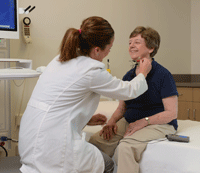In-Patient Rehabilitation
Rehabilitation means reshaping lives and restoring lost abilities after an illness or injury. It means treating the whole patient -- physically, emotionally, and socially. In rehabilitation, the goal is to return patients to their optimum level of function and open the door to a better quality of life.
At our facility, our comprehensive rehabilitation team provides individualized and goal-oriented treatment programs specifically for the older adult. Our focus is to help patients return home or to a lesser level of care.
About Our Services
Our experienced rehabilitation team of therapists, nurses, and physicians serve those patients who have sustained functional loss due to an illness or injury including but not limited to those with:
- Stroke (CVA)
- Head injury
- Spinal cord injury
- Multiple trauma
- Hip fractures
- Neurological disorders (Parkinson’s, MS, Guillain-Barre)
- Orthopedic conditions
Stroke Support Group
Hannibal Regional is pleased to offer a Stroke Support Group. This support group is for anyone impacted by a stroke, as well as their friends and family. Join us as we foster a supportive community and provide assistance to those navigating life after a stroke.
When: Every fourth Wednesday of the month | 2:30 pm to 3:30 pm
Where: The Stroke Support Group will meet in the Sun Room located just inside Hannibal Regional Hospital.
For more information, please call (573) 629-3444.
The Rehab Staff

With an emphasis on rehabilitation, our staff provides innovative treatment approaches to assist patients in returning to a normal lifestyle. Our rehabilitation professionals include occupational therapists, certified occupational therapist assistants, physical therapists, physical therapist assistants, speech-language pathologists, nursing staff, and physicians.
We welcome referrals from physicians, discharge planners, social workers, family members, and case managers. For more information, to request an on-site evaluation of your patient, or to arrange a tour of our facility, please contact us at (573) 629-3444.
Most of our patients did not expect life to take them down a path that would require inpatient rehabilitation. Chances are each patient's illness or injury was unexpected, and now they are uncertain about what the future holds. Our patients can be assured that we are committed to helping them get back their sense of well-being and independence so they can return to the life they treasure.
Hannibal Regional Inpatient Rehabilitation patients are surrounded by a group of highly-trained professionals who care about them and are dedicated to guiding them to a return to a more normal life. We will work as a team to help each patient prepare for life outside of the hospital. We can’t promise our patients that this will be an easy road. It’s work, but it may be the most important work of their life.
About Your Rehab Team
The Medical Director is a physician specially trained in rehabilitation who will coordinate the overall treatment program and oversee the efforts of the rehab team.
Rehabilitation nurses provide around-the-clock personal care and are a good resource for any questions the patient or patient’s family may have about recovery.
Physical therapists will focus on improving mobility, strength and balance. If necessary, they also will instruct on safe and correct use of mobility devices such as walkers and canes, braces and artificial limbs. Occupational Therapists focus on improving everyday living skills, including bathing, dressing and eating. They also may train the patient on equipment that will help them better perform these activities. Speech-Language Pathologists will assess and treat the patient’s ability to communicate, problem solve and reason. They also may address problems with swallowing.
Other individuals on the rehabilitation team may include a dietitian, psychologist. orthopedic/prosthetic consultant and others.
Therapy sessions and activities are posted on a daily schedule board. Each patient’s personal physician may continue to follow their progress and remain in charge of their medical care.
What Patients Can Expect
During the initial phase of treatment, patients may be asked to participate in a series of evaluations. It is critical that we perform a complete assessment because individual treatment programs will be based on the needs that are identified.
Most patients will receive a minimum of three hours of therapy each day, at least five days a week. Therapy may take place in both individual and group treatment settings, and sessions will be scheduled for various times throughout the day.
Prior to discharge, a case manager meets with each patient and their family to discuss any services or equipment needed after leaving the hospital. We may schedule a home visit to identify any potential hazards or necessary modifications.
Patients will receive a follow-up call about two weeks after discharge and again at three months to discuss concerns and to check on the patient’s progress. A rehabilitation program can be challenging, but the individual needs and goals of each patient are our top priority.